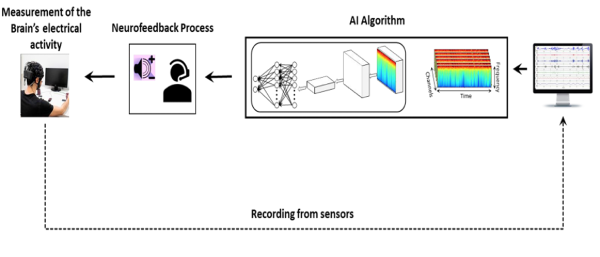Investigators:
Robert Hager, Preveal Technologies, Inc
Hassan Ghasemzadeh, Arizona State University
MassAITC Cohort: Year 2 (AD/ADRD)

Project Accomplishments: The Preveal pilot project focused on developing an in-home cognitive improvement system using EEG-based neurofeedback (EEG-NFB) to monitor and enhance working memory in older adults. The team designed advanced AI algorithms, including convolutional neural networks (CNNs), to classify EEG signals and detect peak working memory states using visual representations like scalograms and directed transfer functions (DTF). They trained these models on publicly available EEG datasets and achieved high classification accuracy, including 100% accuracy in distinguishing between low and high mental workload states using a hybrid model. Additionally, they developed a self-supervised learning approach that achieved 99.5% accuracy with only 50% of labeled data, demonstrating strong performance even with limited training data.
Beyond algorithm development, the team created an integrated software platform that administers working memory tasks, collects real-time EEG data, and provides personalized prompts to engage users. Usability features included animated instructional videos and caregiver-assisted prompts tailored to individual needs. The project also collected EEG data during working memory tasks to further refine their models. These efforts laid the groundwork for future clinical trials, and the team secured additional funding to expand testing in clinical settings. The project culminated in a published paper and strong support from clinical partners, highlighting its potential to improve cognitive health outcomes for individuals with mild cognitive impairment.
Initial Proposal Abstract: The goal of this proposal is to develop an Electroencephalography (EEG) neurofeedback (NFB) prototype system consisting of a headset and machine learning algorithm coupled with music, that can be used in the home to improve working memory.
Neural network software will be trained with EEG collected from the headset to distinguish brainwave patterns generated when the user is engaged in working memory-related tasks as reflected in the NIH Toolbox List Sorting Test. The user will be prompted to elicit these patterns based on personalized goals and the platform will increase the volume of music chosen by the user to indicate that the goal has been met. This system will supplement cognitive training with NFB to enhance cortical dynamics.
This project will address the hurdles of integrating machine learning with neurofeedback, designing an easy to use tablet/headset system with integrated algorithm controlled music and testing the feasibility of the system for home use. To clear these hurdles, the following goals will be achieved: (1) design of a near real-time convolutional neural network (CNN) machine learning algorithm to capture EEG features of peak WM. Publicly available EEG datasets that recorded brain activity while performing the NIH Toolbox List Sorting Test will be used to refine the CNN algorithm to respond to frontoparietal activation patterns associated with peak WM in each user. (2) development of hardware/software systems integrating EEG recording, classification and stimulus modulation. An adjustable EEG headset will integrate headphones and OpenBCI hardware.
Outcomes:
- Poster Presentation: a2 National Symposium 2024
 Title: In-home Cognitive Improvement Training using EEG-NFB Authors: Will Clegern, Nooshin Taheri, Thomas Lambert, Hassan Ghasemzadeh, Lonnie Nelson, Robert Hager
Title: In-home Cognitive Improvement Training using EEG-NFB Authors: Will Clegern, Nooshin Taheri, Thomas Lambert, Hassan Ghasemzadeh, Lonnie Nelson, Robert Hager - Grant Funding: $137,275 from the Health Sciences & Services Authority of Spokane County
 The Health Sciences & Services Authority of Spokane County awarded Preveal $137,275 in matching funds to conduct a feasibility study of their Incite Cognitive Improvement System. Source: https://hssaspokane.org/news-press-releases
The Health Sciences & Services Authority of Spokane County awarded Preveal $137,275 in matching funds to conduct a feasibility study of their Incite Cognitive Improvement System. Source: https://hssaspokane.org/news-press-releases - Patent: Patent Application Submitted
 A Provisional Patent was filed on 8/3/23 at the US Patent Office.
A Provisional Patent was filed on 8/3/23 at the US Patent Office.
